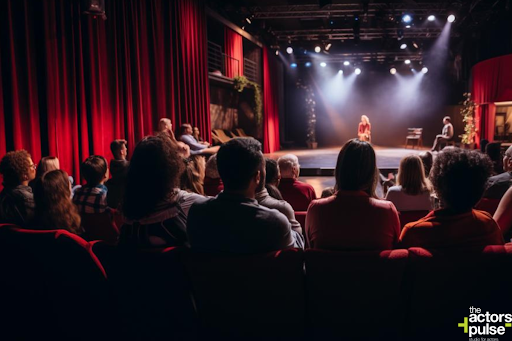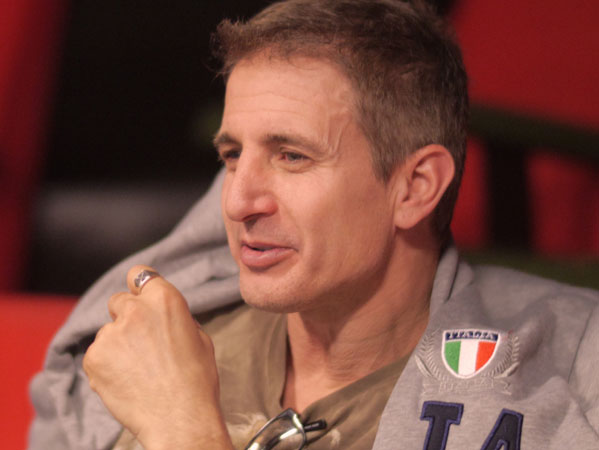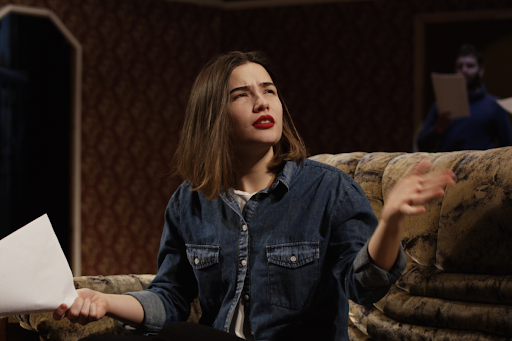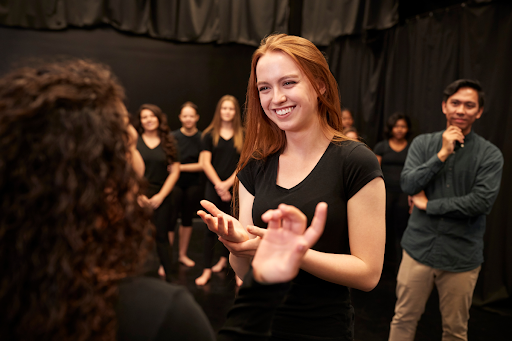Improvisation Techniques for Actors: Learning to Think on Your Feet
Contents
ToggleFor anyone inexperienced with acting, the idea that an actor would ever need to make something up on the spot may seem quite confusing. After all, aren’t actors guided by scripts that they simply learn and repeat lines from?
Of course, as actors, we know that while memory and repetition play a role in delivering a great performance, there are plenty of times when you have to improvise.
This ability to think on your feet is something some of us are naturally quite good at, but it is also a skill you can learn and practice. No matter how good you may be at improvising or how long you have been acting, continued practice is highly recommended.
In this guide, we’ll take a closer look at improvisation in acting, its importance, benefits, techniques to try and how this ties in with the Meisner Technique.
What Is Improvisation In Acting?
Improvisation (improv) in acting refers to the practice of an actor, in character performing a role without prior rehearsals or a script to follow.
An actor may know in advance that improv is required, or may implement this during a performance when lines are forgotten or when something unexpected occurs.
Improv can appear in different settings – one of which is improvisational theatre which is entirely spontaneous and a standalone art form in itself. These made-up storylines are delivered on the spot with zero rehearsal or scripting and are often comedic in nature.
Improvisation can also be seen in most other performance settings to varying degrees and is considered a fundamental part of dramatic acting.

Why Is Improvisation So Important?
Regardless of whether you desire to become a master of improv theatre, practising this skill is essential if you want to be a great actor.
Improv is incredibly beneficial and can help actors to:
- Stretch their imaginations
- Free up their minds and be less rigid
- Develop better creativity and instinctual responses
- Become more confident
- Expertly overcome the unexpected mid-performance
- More deeply connect with their character and other actors
- Learn better listening skills
- Respond more honestly
Aiding in the delivery of truly unforgettable performances, these are just some of the reasons why every actor should prioritise improv as part of their acting training.
Stand Out.
Check our term dates, and enrol in classes today.
When To Start With Improvisation
Improvisation is a skill that should be focused on right from the beginning of your acting journey.
If not already incorporated into your acting classes, it is recommended to attend dedicated improv classes alongside your other training or within a few months of starting acting.
Ideally, you will continue to practice improvisation (using techniques such as those we will outline below) throughout your career, but should intensely focus on this for at least 6 months early on.
10 Techniques To Improve Your Improv
All improvisation techniques are intended to help you disconnect and implement rapid, on-the-spot, instinctual responses for greater connection with yourself, scene partner and audience.
In this section, we’ll discuss techniques for improving your improv skills while using the ‘Yes, And…’ activity
In this activity, you embrace and accept what your scene partner tells you (yes) and then build on it (and). This encourages continued collaboration, active listening, and spontaneity and keeps scenes moving quickly.
While practising this activity, focus on incorporating the following techniques.
1. Object Work
This involves miming an object, usually using your hands to add to a scene’s realism and support your dialogue.
Examples of object work include pretending to drink a beer, opening doors or driving a car – as improv involves no props, your skill in object work can become a powerful storytelling technique.
2. Emotion
In acting, the direction and meaning of a scene rely heavily on the emotional subtext. Delivering the emotion behind what is being said is critical.
Working with a partner, start with an emotion, such as sadness. Then, using the ‘yes, and..’ principle, see if you can naturally shift from sadness to anger, happiness or another emotion as you build the dialogue.
3. Establish Common Ground
Try to start an improv scene by focusing on relatable situations that make it easier for your scene partner to build on.
For instance, opening with a joke to which your partner doesn’t know the punchline gives them nothing to go on and the scene will fall flat.
Instead, introduce a location or circumstance such as a restaurant or that you’re on a blind date for example. Finding this common ground makes for a great starting point as it’s something most of us can relate to and therefore more naturally respond to.
4. Master Your Feelings
To excel at improv you need to get comfortable with not knowing what is coming next and learn how to remain confident in the face of the unknown.
Showing fear, panic or uncertainty can instantly cause your audience to doubt or lose trust in the performance. There is no one improv activity you can do to overcome challenges with this, instead continued practice is key.
5. Don’t Judge
The minute you pause to judge your idea or that of your scene partner, the scene is in trouble. Judgement brings with it distrust, negativity and discomfort which makes the natural exchange of banter much more challenging to achieve.
If you’re presented with a situation or idea by your scene partner that you hate, focus on remaining flexible with open-ended dialogue such as ‘That’s interesting, can you tell me more?’
Never negate what they’ve said as this interrupts the reality they’ve created, shuts the conversation down and makes continued communication difficult.
6. Be An Active Listener
It can be incredibly hard to actively listen when you’re also having to quickly formulate a great response.
However, in improvisation, if you are not listening, understanding or communicating, it severely compromises your ability to deliver the right response and keep the scene moving.
Remember, it’s okay to pause before responding, so allow your scene partner to finish what they are saying before giving your reply or interrupting.
This not only ensures you don’t miss half of what they were saying but gives you a chance to consider the intent behind what they said. Again, this gets easier with practice!
7. Pay Attention To Body Language
One technique that can help you nail the improv game is to become highly attuned to body language. Monitoring changes in body language during an exchange can help to keep you and your scene partner aligned.
For instance, starting a scene faced with the beaming smile of your fellow actor or a deep scowl is going to give you a big indication of what is coming next.
Continuing to be aware of this and how you use your own body language will help guide the scene and create more believable exchanges when partnered with dialogue.
People-watching is a great way to become more aware of body language and watching videos of your own performances can help too.
8. Focus On The Moment
Improv is all about what is happening at the moment. The minute you start to let your mind wander and begin imagining some amazing future plot to follow, things can quickly unravel.
One way to keep yourself focused is to imagine that everything your scene partner does drives you crazy. This ensures you pay more attention to your partner than yourself, remain in the moment and don’t get ahead of yourself.
9. Create Conflict
Conflict of some kind is essential to any scene and can save our performance from becoming boring.
As soon as scene characters are established, make it obvious that something the other character is doing irritates you. Your scene partner should pick up on this and do it more or vice versa.
This creates an undercurrent of conflict which can be heightened as the story moves forward adding depth, honesty and relatability to the performance.
10. Embrace Mistakes
The beauty of improv is that mistakes make for opportunities rather than obstacles. Learning to embrace and overcome hiccups is one of the most powerful tools you can have as an actor.
When things go awry during improv, simply incorporate it into your scene as best you can and turn it into a creative choice. Being able to do this can help you remain calm and may even lead to a better performance.
The Actors Pulse – Leaders In Improvisation
As the leading school for the Meisner Technique in the Southern Hemisphere, The Actors Pulse are experts in improvisation.
With so much of Meisner’s teaching focused on and encouraging improvisation in acting, our classes incorporate a variety of methods designed to hone your improv skills.
Become an expert at improv while learning other key acting skills and techniques as part of our holistic curriculum.
Offering flexible class schedules and full or part-time acting courses, we give our students the support, encouragement and in-depth education they need to thrive as actors.
Whether you are a beginner or have been acting for years, our approach to acting, guided by Meisner’s principles, can see you excel on stage or screen.
To learn more or to book a place in one of our sought-after classes, call today at 0414 475 515.

Billy Milionis is one of the few Australians to have ever studied under the legendary master teacher, the late Sanford Meisner. Billy has also studied story structure and scene analysis techniques with John Truby and later at UCLA. He has also spent several years doing improvisation in Hollywood with the L.A. Connection. In addition, he trained in the technique of Stella Adler, Practical Aesthetics and Lee Strasberg’s method.





